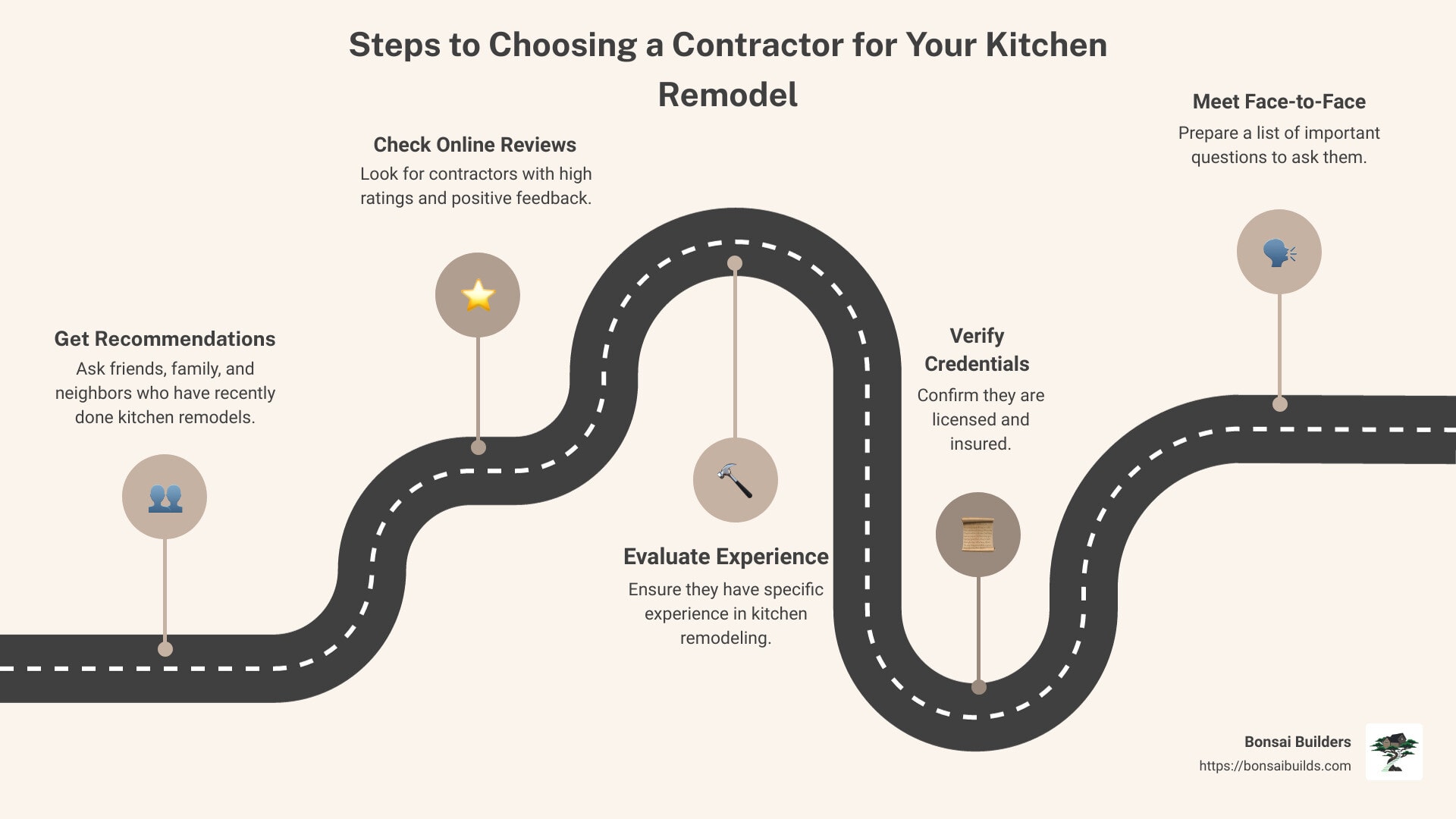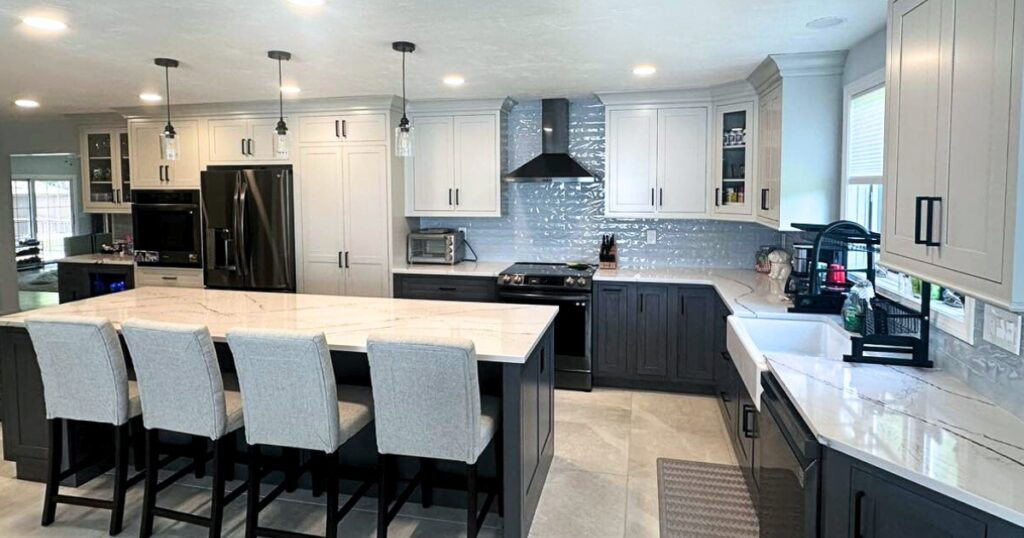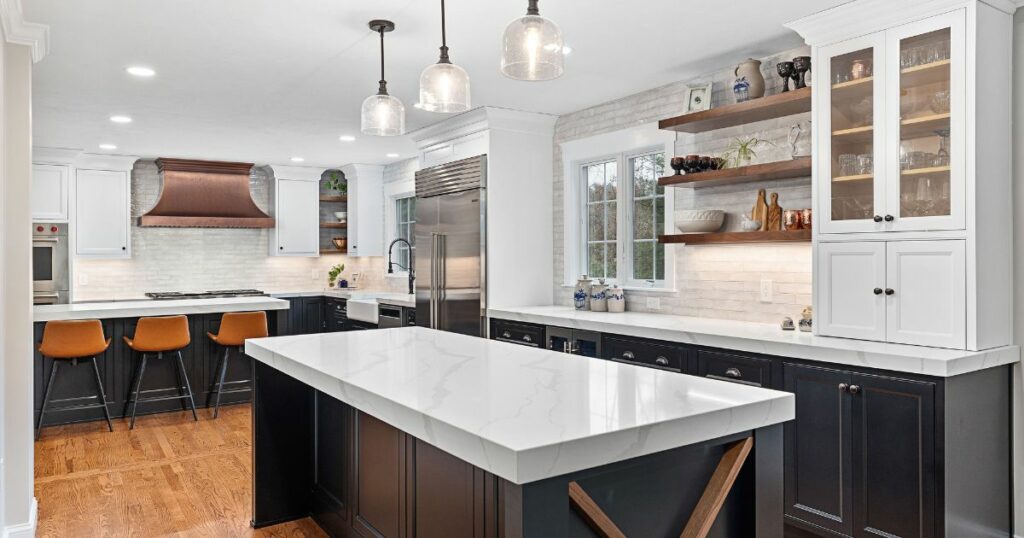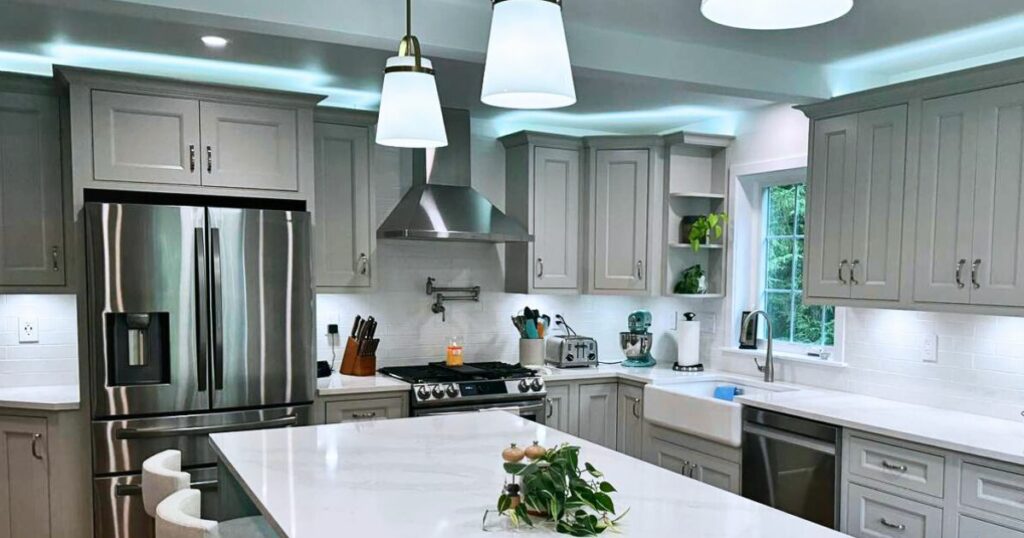Mastering the Art of Choosing a Kitchen Remodel Contractor
When considering how to choose a contractor for kitchen remodel, it’s crucial to make the right choice from the outset. Selecting the best kitchen remodeling contractor will directly impact the functionality, aesthetics, and return on investment (ROI) of your project. Here’s a quick 7-step guide:
- Get Recommendations: Ask friends, family, and neighbors who have recently done kitchen remodels.
- Check Online Reviews: Look for contractors with high ratings and positive feedback. Utilize resources like the Better Business Bureau to check contractor ratings.
- Evaluate Experience: Ensure they have specific experience in kitchen remodeling.
- Verify Credentials: Confirm they are licensed and insured.
- Meet Face-to-Face: Prepare a list of important questions to ask them.
- Review References: Speak to at least three past clients about their experiences.
- Get Detailed Proposals: Ask for itemized estimates to compare costs and services.
Selecting the right contractor ensures your kitchen renovation will be smooth and stress-free, ultimately enhancing your home’s value and your enjoyment of the space.
I’m Kristin Hintlian, co-owner of Bonsai Builders, a trusted name in Massachusetts with over 26 years of experience. My expertise in the construction industry helps homeowners steer how to choose a contractor for kitchen remodel projects with confidence.

Table of Contents
Understanding the Basics of Kitchen Remodeling
Before diving into your kitchen remodel, grasp some foundational aspects. This will help you communicate effectively with your contractor and ensure your project aligns with your vision and budget.
Scope of Work
The scope of work defines what will be included in your kitchen remodel. It can range from minor updates, like replacing countertops and cabinets, to major overhauls involving structural changes.
Minor Updates:
- Replacing countertops
- Updating cabinets and hardware
- Installing new appliances
Major Overhauls:
- Knocking down walls to create an open floor plan
- Moving plumbing and electrical lines
- Adding new windows or skylights
Understanding the scope will help you get accurate quotes and avoid surprises later on. This is crucial for a successful kitchen remodeling project.
Budget Considerations
Setting a realistic budget is crucial. Kitchen remodels can be expensive, with costs ranging from $14,600 to $40,600 depending on the project’s size and complexity. Here’s a quick breakdown of where your money might go:
Item Percentage of Budget
Cabinets 30%
Labor 20%
Appliances 15%
Countertops 10%
Flooring 7%
Lighting 5%
Plumbing 5%
Miscellaneous (permits, etc.) 8%
Tip: Always include a contingency fund of 10-20% for unexpected expenses.
Design Preferences
Your design preferences will shape the look and feel of your new kitchen. Here are some questions to help you define your style:
- What do I want my kitchen to look like?
- Traditional, modern, or transitional?
- How will I use the kitchen?
- For cooking, entertaining, or both?
- What materials and finishes do I prefer?
- Wood, stainless steel, or quartz?
Pro Tip: Consider the “work triangle”—the optimal distance between the sink, stove, and refrigerator. This layout improves efficiency and functionality.
By understanding these basics, you’ll be better prepared to discuss your project with contractors, ensuring a smoother and more successful kitchen remodel.
Next, we’ll dive into how to choose the right contractor for your kitchen remodel, starting with evaluating their credentials and experience.
How to Choose a Contractor for Kitchen Remodel

Evaluating Contractor Credentials
Referrals, Online Reviews, and Contractor Websites
The best place to start your search for a kitchen remodel contractor is through referrals. Ask friends, family, coworkers, and neighbors if they have any recommendations. Personal experiences can provide valuable insights that online reviews might miss.
Next, look at online reviews from platforms like Angie’s List, HomeAdvisor, or Houzz. While some reviews might not be 100% accurate, they often give a good sense of the contractor’s reputation. Look for patterns in the feedback. Are there consistent complaints or praises?
Finally, visit contractor websites. A good contractor’s website will showcase their work, provide information about their experience, and list their credentials. Look for examples of past kitchen remodels to ensure their style matches your vision.
Licensing, Insurance, and Certifications
Always verify that your contractor is licensed and insured. States grant contractor licenses after rigorous testing, ensuring they have the necessary knowledge and skills. You can check licensing with your state’s licensing board.
Hiring an insured contractor is crucial. Insurance protects you from liability if someone gets injured on your property during the remodel. Ask for the contractor’s certificate of insurance (COI) and verify its validity with the insurance carrier. This ensures the contractor is legitimate and trustworthy.
Look for certifications from reputable organizations like the National Kitchen and Bath Association (NKBA), the National Association of the Remodeling Industry (NARI), or the National Association of Home Builders (NAHB). These certifications indicate a commitment to professionalism and ongoing education.
Interviewing Potential Contractors
Questions to Ask
Once you’ve shortlisted potential kitchen remodeling contractors, schedule interviews. Here are some key questions to ask:
- Are you licensed, bonded, and insured?
- What is your experience with remodeling kitchens? Have you completed any projects like this one?
- Can I have a list of references from recent kitchen remodels?
- How many projects do you run at the same time?
- What phases of the project will you handle versus subcontractors?
- How long do you anticipate my project will take?
- What permits will be required for my project? Who will obtain them?
- What are your methods for communication? How can I contact you throughout the project?
- What’s your expected payment schedule?
- Why is your quote different from another I received?
Communication Style and Experience with Kitchens
Communication style is crucial. You need a contractor who is responsive and transparent. During the interview, take note of how they answer your questions. Are they clear and concise? Do they provide detailed explanations?
Experience specifically with kitchen remodels is another key factor. Kitchen remodeling contractors who have completed multiple kitchen projects will be more adept at handling the unique challenges that come with kitchen renovations, such as plumbing and electrical work, cabinetry installation, and layout optimization.
For example, a contractor might share a story about a past project where they had to overcome a significant challenge, like finding outdated wiring that needed to be replaced. Their ability to steer such issues smoothly can give you confidence in their expertise.
By thoroughly evaluating credentials and conducting detailed interviews, you’ll be well on your way to finding the right kitchen remodeling contractor for your project.
Next, we’ll explore key considerations when selecting your contractor, including how to analyze their portfolio and assess quotes and estimates.
Key Considerations When Selecting Your Contractor

When selecting remodeling contractors for your kitchen remodel, there are several key considerations to keep in mind. Finding reliable and experienced professionals is crucial for a successful renovation project. Let’s explore the details.
Portfolio Analysis
Check out their portfolio. Ask to see photos, blueprints, and sketches of their past work. Look for examples of kitchen remodels specifically. This will help you gauge their style compatibility with your vision. Selecting the best kitchen remodeling contractors is crucial, as reliable and experienced professionals will enhance both the functionality and value of your kitchen. If their portfolio isn’t deep, it might mean they lack experience or only showcase a few successful projects.
Tip: Pay attention to workmanship and style details to ensure they meet your standards.
Past Client Feedback
Verify their reputation. Ask for references from recent kitchen remodels. Contacting past clients can provide valuable insights into the contractor’s reliability and work quality. A simple question like, “What do you wish had gone differently?” can reveal a lot.
Tip: Online reviews on platforms like Angie’s List and HomeAdvisor can also be helpful, but take them with a grain of salt.
Assessing Quotes and Estimates
Get written estimates. Request detailed, itemized bids from each contractor. This should include costs for materials, labor, profit margins, and other expenses. Itemized bids make it easier to compare quotes and identify any discrepancies.
Tip: Be wary of unusually low estimates. They might be lowballing to win the job, only to add hidden costs later.
Cost Comparison and Material Costs
Compare costs. Look at the breakdown of each estimate. Are the material costs reasonable? How do labor costs compare? Understanding these details can help you make an informed decision.
Tip: Research national and local averages for kitchen remodel costs to ensure you’re getting a fair deal.
Importance of a Detailed Contract
Once you’ve chosen a contractor, it’s crucial to have a detailed written contract. This document is as important as any blueprint or design schematic. Here’s what to look for:
Scope Clarity
The contract should clearly outline the scope of work. This includes what tasks will be performed, the materials to be used, and any specific details about the project.
Timeline
Make sure the contract specifies start and projected completion dates. This helps keep the project on track and sets clear expectations.
Payment Terms
The contract should detail the payment schedule. Payments are often tied to project milestones. For example, a portion might be due after demolition, another after cabinetry installation, and the final payment upon project completion.
Change Orders
Change orders are modifications to the original contract. The contract should outline how these will be handled, including any additional costs and timeline adjustments.
Tip: Ensure there’s a written agreement that the contractor will obtain lien releases from all subcontractors and suppliers. This protects you if the bills aren’t paid.
By focusing on these key considerations, you’ll be better equipped to choose the right contractor for your kitchen remodel. Next, we’ll discuss how to plan and manage your kitchen remodel project effectively.
Planning and Managing Your Kitchen Remodeling Project

Setting Realistic Expectations
Planning and managing your kitchen remodel project is crucial to ensure a smooth and successful renovation. Here’s how to set realistic expectations and steer the process.
Timeline Planning
Understand the timeline. A kitchen remodel can take anywhere from a few weeks to several months, depending on the scope of work. Discuss a detailed timeline with your contractor. Make sure to account for potential delays, such as material backorders or unexpected structural issues.
Tip: Include buffer time in your schedule to accommodate unforeseen delays. A homeowner shared, “We planned for a 3-month remodel but added an extra month just in case. It saved us a lot of stress when delays happened.”
Living Through Renovation
Prepare for disruptions. Renovating a kitchen can disrupt your daily life. Expect noise, dust, and limited access to parts of your home. Communicate with your contractor about work hours and any specific concerns you have.
Tip: Take breaks from the construction zone. Spend time outdoors or visit friends and family to maintain your sanity.
Temporary Kitchen Setups
Set up a temporary kitchen. Creating a makeshift kitchen is essential while your main kitchen is out of commission. Use basic appliances like a microwave, toaster oven, and an Instant Pot. Relocate your refrigerator to a convenient spot, like the garage or another room.
Tip: One homeowner shared, “We set up a temporary living/kitchen/dining space in our sunroom, and it worked out great.”
Project Duration
Be realistic about the duration. The duration of your kitchen remodel depends on the complexity of the project. Simple updates might take a few weeks, while a complete remodel could take several months.
Tip: Stay flexible and prepared for adjustments. Delays can happen, but being adaptable will help you manage them without too much stress.
Disruptions
Expect disruptions. Construction noise, dust, and limited access to parts of your home are unavoidable. Plan for these disruptions and communicate with your contractor about minimizing them.
Tip: Focus on the end goal—a beautiful, functional kitchen. Keeping the big picture in mind can help you stay positive during the renovation.
Budget Adjustments
Plan for budget adjustments. Unforeseen issues can lead to additional costs. Set aside a contingency fund to cover unexpected expenses.
Tip: It’s recommended to allocate 10-20% of your total budget as a contingency fund. This will help you handle surprises without derailing your project.
By setting realistic expectations and planning for potential challenges, you can steer your kitchen remodel with less stress and more confidence. Up next, we’ll tackle frequently asked questions about kitchen remodeling to help you further prepare for your project.
Conclusion
Choosing the right contractor for your kitchen remodel is one of the most critical decisions you’ll make during the renovation process. It impacts not only the quality of the work but also your overall experience and satisfaction with the project.
Final Decision Making
When making your final decision, consider the following:
- Evaluate All Information: Review all the estimates, interviews, and references. Look at each contractor’s experience, expertise, and compatibility with your vision.
- Compare Costs and Quality: While cost is important, the cheapest option isn’t always the best. Assess the value offered by each contractor in terms of materials, workmanship, and reliability.
- Trust Your Gut: If you have a good feeling about a contractor and they meet all your criteria, trust your instincts. Compatibility and trust are crucial for a smooth project.
Importance of Compatibility
Compatibility with your contractor cannot be overstated. A contractor who understands your style, communicates effectively, and respects your home will make the renovation process much more enjoyable. As one client said, “If quality, communication, and having your contractor show up when they say they will is important to you, then I would highly recommend Bonsai Builders.”
Bonsai Builders’ Expertise in Upscale Kitchen Remodels
At Bonsai Builders, we specialize in changing kitchen spaces with master craftsmanship and exquisite designs. Our focus on high-end finishes and attention to detail ensures that your kitchen will not only be functional but also a stunning centerpiece in your home.
We have over 26 years of experience and have completed over 125 jobs across Massachusetts, consistently earning accolades and positive reviews from clients. Our commitment to quality and customer satisfaction makes us a trusted choice for your kitchen remodel.
For more information on how we can help you create your dream kitchen, visit our kitchen remodeling service page and contact us today to get started on your project.
By carefully considering your options and choosing a contractor who aligns with your vision and values, you can ensure a successful and satisfying kitchen remodel. Contact Bonsai Builders today, we are dedicated to making your dream kitchen a reality.
Frequently Asked Questions about Kitchen Remodeling
What is the biggest expense in a kitchen remodel?
The biggest expense in a kitchen remodel is usually the cabinets. Custom cabinets can transform the look and functionality of your kitchen but come with a hefty price tag. According to Forbes, custom cabinets can be one of the most significant investments in a kitchen remodel.
Other high-cost items include:
- Countertops: Materials like granite, quartz, or marble can be pricey.
- Appliances: High-end or smart appliances can add a substantial amount to your budget.
Tip: Prioritize your budget based on what’s most important to you. If custom cabinets are a must, consider saving on other elements like flooring or lighting.
Is $30,000 enough for a kitchen remodel?
Yes, $30,000 can be enough for a kitchen remodel, but the extent of the remodel will be limited. According to the 2021 national average, $30,000 can cover a 200 square foot kitchen with semi-custom cabinets, minor layout changes, new appliances, and a quartz countertop.
Factors that influence costs:
- Kitchen size: A larger kitchen will require more materials and labor.
- Materials: Opting for semi-custom cabinets and laminate countertops can help stay within budget.
- Scope of work: Minor layout changes and no structural modifications can keep costs down.
Tip: Clearly define your priorities and must-haves. Allocate your budget to the most critical aspects of your remodel.
How to negotiate with a kitchen contractor?
Negotiating with a kitchen contractor can help you get the best value for your money. Here are some tips to ensure a successful negotiation:
- Get Multiple Quotes: Solicit bids from several contractors to compare prices and services. Make sure each quote is detailed and covers the same scope of work.
- Know the Market Rates: Research national and local averages for kitchen remodel costs. Use this information to negotiate a fair price.
- Leverage Other Quotes: Use the quotes you’ve gathered as leverage. If one contractor is offering a better deal, mention it to others to see if they can match or beat it.
- Discuss Payment Terms: Many contractors require a down payment of 30% to 50%, with the balance due upon completion. Ensure the payment schedule aligns with your budget and project milestones.
- Negotiate on Extras: Ask if there’s room for discounts on materials or additional services. Some contractors may offer deals on bulk purchases or seasonal promotions.
Tip: Be clear about your budget and priorities. A transparent conversation can lead to a mutually beneficial agreement.
By understanding the biggest expenses, setting realistic budgets, and negotiating effectively, you can steer your kitchen remodel with confidence and ease. Now, let’s dive deeper into the details of planning and managing your kitchen remodel project.
Our Content
Our experienced contractors and design specialists carefully review and edit all content to ensure it meets our high standards for quality and accuracy. We do this to provide our readers with content that is accurate, complete, reliable, and up-to-date. Bonsai Builders, located in Sutton, Massachusetts is a trusted neighborhood building source across Massachusetts for kitchen remodeling, luxury kitchen ideas, kitchen renovation, home remodel, and more with over 26 years of experience and over 125 jobs completed.
Bonsai Builders has renovated many split-level home kitchens across Massachusetts. Bonsai Builders is selected as best of Houzz year after year further showing their expertise and trust among homeowners in Massachusetts.

